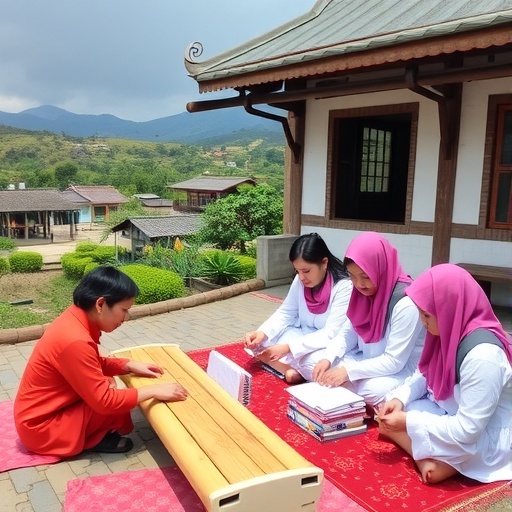In the contemporary landscape of education, the significance of school climate has garnered immense attention, particularly in the context of poverty-stricken areas. The intricate relationship between the perceptions students hold about their educational environment and their overall development has been substantiated through extensive research. A groundbreaking study delves into this very topic, focusing on the perception of school climate and its implications for positive youth development in impoverished rural regions of China.
Rural China, characterized by socioeconomic challenges and educational disparities, serves as the focal backdrop of this research. The authors, Qi, Chen, and Wang, meticulously examine how students’ perceptions of their school environment can influence their developmental trajectories, particularly amidst the adversity posed by poverty. They hypothesize that a positive school climate can catalyze essential developmental milestones in adolescents, equipping them with critical life skills and social competencies.
Intentional self-regulation, a central tenet of the study, emerges as a pivotal mechanism mediating the relationship between school climate and youth development. This concept refers to the ability of individuals to manage their thoughts, emotions, and behaviors to achieve specific goals. In the context of young individuals grappling with the pressures of poverty, the ability to self-regulate can greatly enhance their academic performance and social interactions, ultimately fostering a path toward successful adulthood.
The researchers conducted their study with a robust methodological framework that included surveys and interviews with students across various rural schools. The participatory approach ensured that the voices of the youth were strongly represented, facilitating an authentic understanding of their experiences and perceptions. Through their qualitative and quantitative analyses, the authors highlight a direct correlation between the positive perceptions of school climate and improved outcomes in intentional self-regulation.
Delving deeper into the findings, the study reveals that students in supportive and nurturing school environments exhibit higher levels of self-awareness and emotional intelligence. These attributes are critical for effective self-regulation, enabling youth to navigate the complexities of adolescence, particularly in a challenging economic context. The researchers found that when students perceive their school as a safe and encouraging space, they are more likely to engage in proactive behaviors that promote their personal and academic growth.
Conversely, the findings also shed light on the detrimental effects of a negative school climate. Students who perceive their educational environments as hostile or neglectful tend to experience higher levels of anxiety and lower levels of self-regulation. This is particularly alarming, as it perpetuates a cycle of poor academic achievement and limited opportunities for personal development among youth in poverty-stricken regions. The authors argue that addressing these detrimental perceptions should be a priority for educators and policymakers alike.
One of the most compelling aspects of this research is its implications for educational reform. The authors advocate for targeted interventions aimed at cultivating a positive school climate in rural areas, highlighting the need for comprehensive training for educators to foster supportive relationships with students. Initiatives such as mentorship programs, extracurricular activities, and community engagement strategies can be instrumental in transforming the school environment into a nurturing space for youth development.
Furthermore, the study emphasizes the importance of involving parents and community members in the educational process. Strong ties between schools and families can create a unified support system for young individuals, promoting a cohesive approach to education and personal growth. Collaborative efforts can enhance students’ perceptions of their school climate, leading to improved outcomes in self-regulation and overall well-being.
As the global community continues to grapple with poverty and its ramifications, the insights gleaned from this study are more relevant than ever. The findings underscore the urgent need for a multifaceted approach to education that recognizes the critical role of school climate in fostering resilience among youth. This research calls for a reevaluation of current educational practices, particularly in rural areas where resources are scarce and challenges are pronounced.
By investing in the emotional and social components of education, stakeholders can create a more equitable learning environment for all students. This not only benefits individuals but also contributes to the broader societal framework by cultivating a generation of self-regulated and resilient youth ready to tackle future challenges. The implications of this study extend beyond the realm of academia; they touch upon critical societal issues such as poverty alleviation and community development.
In conclusion, the research conducted by Qi, Chen, and Wang provides a valuable lens through which to view the interconnectedness of school climate, intentional self-regulation, and positive youth development. It serves as a clarion call for educators, policymakers, and community leaders to prioritize the social and emotional aspects of education, particularly in impoverished rural settings. Through collaborative efforts and targeted interventions, it is possible to reshape the educational landscape and, ultimately, the future of rising generations.
Subject of Research: Perception of School Climate and Positive Youth Development in Poverty-Stricken Rural China
Article Title: Perception of School Climate and Positive Youth Development in Poverty-Stricken Rural China: The Mediating Role of Intentional Self-Regulation
Article References:
Qi, L., Chen, J. & Wang, M. Perception of School Climate and Positive Youth Development in Poverty-Stricken Rural China: The Mediating Role of Intentional Self-Regulation.
Applied Research Quality Life (2025). https://doi.org/10.1007/s11482-025-10483-5
Image Credits: AI Generated
DOI: 10.1007/s11482-025-10483-5
Keywords: School Climate, Youth Development, Intentional Self-Regulation, Rural Education, Poverty, China




